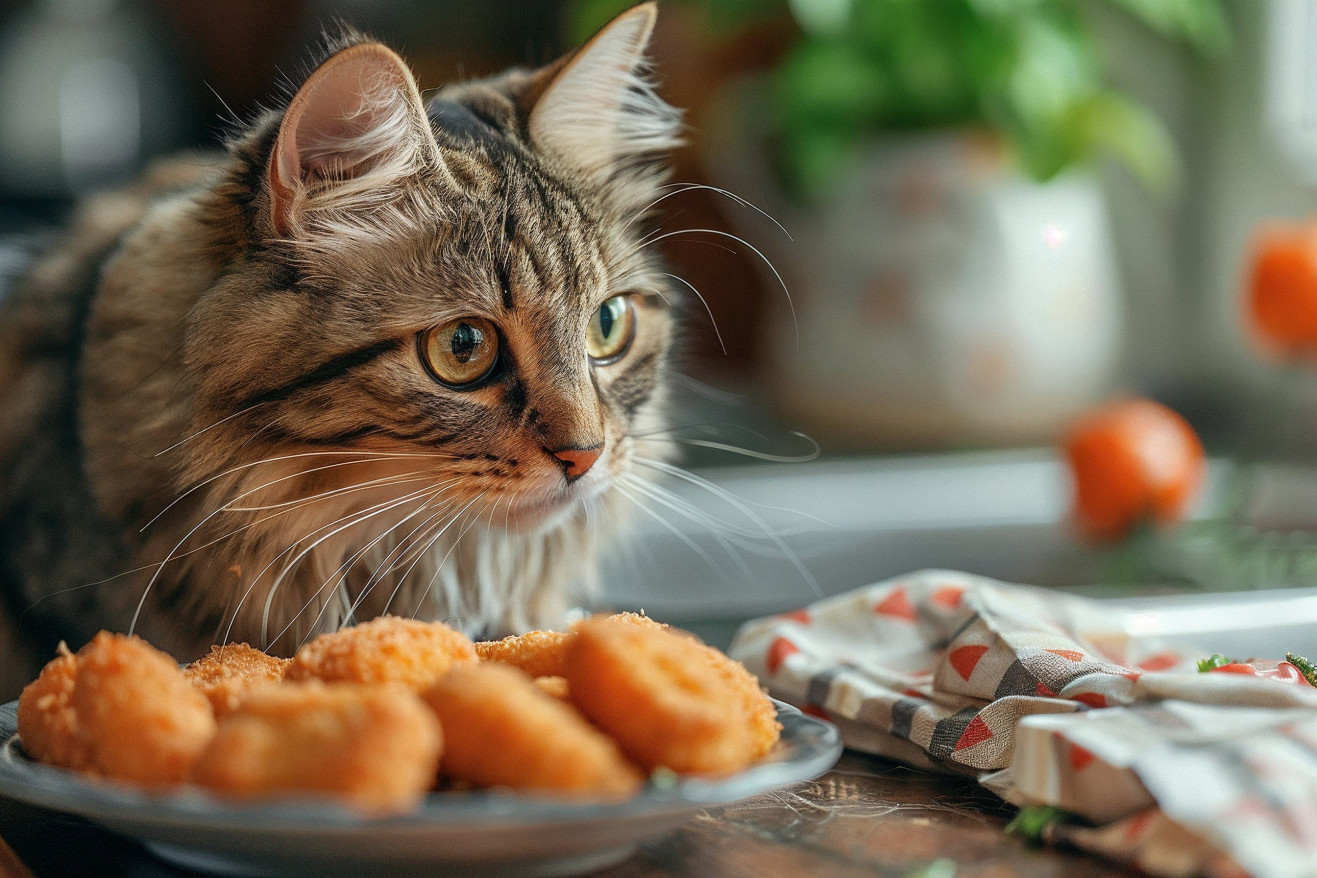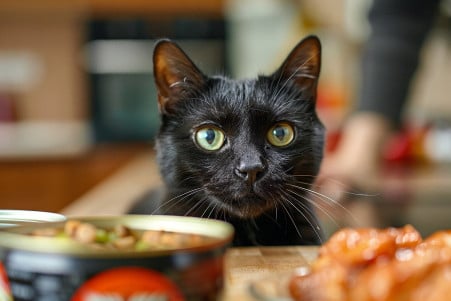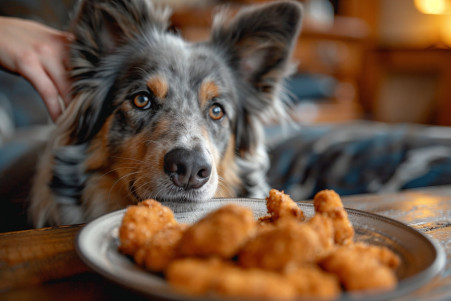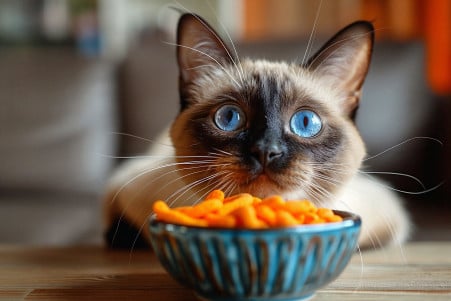Can Cats Have Chicken Nuggets? What to Know
3 May 2024 • Updated 3 May 2024

If you’ve ever had a chicken nugget and a cat begging for a bite at the same time, you may have asked yourself if it’s okay to give your cat a piece. While a small piece of plain, cooked chicken is fine, chicken nuggets and other breaded and fried foods are not recommended because they can upset your cat’s stomach and lead to weight gain. Instead, you should always opt for cat treats and cat food that’s been created to meet your pet’s specific nutritional needs.
This article will explore the potential risks and benefits of feeding your cat chicken nuggets and other human foods by looking at studies written by veterinary nutritionists and other experts in feline health. You’ll learn more about the ingredients in processed foods that can be problematic and how you can feed your cat chicken in a way that’s safe and healthy. This will help you make the best decisions for your cat.
Can cats eat chicken nuggets?
Dangerous Ingredients in Chicken Nuggets and Other Human Foods
Chicken nuggets contain several ingredients that are toxic to cats, including onions and garlic, which can cause a cat's red blood cells to burst, resulting in anemia and other health problems. They are also high in salt and fat, which the ASPCA notes can lead to vomiting, diarrhea, and pancreatitis in cats.
In addition to chicken nuggets, there are several other human foods that can be dangerous to cats due to the health issues they can cause. Chocolate contains methylxanthines such as theobromine that are poisonous to cats and can cause vomiting, tremors, and death. Grapes, raisins, and caffeine-containing products can be toxic and even deadly to cats and can cause kidney failure and neurological problems.
Raw meat, seafood, and eggs can all be contaminated with bacteria like Salmonella that can make cats very sick. Bones can cause choking and may puncture the gastrointestinal tract. While cats are obligate carnivores, their nutritional needs are different from those of humans and dogs, so it's not recommended that they eat a diet of human or dog food. To avoid accidental poisoning, it's important to keep all toxic human foods safely stored away from cats and ensure they are fed a diet that meets their nutritional needs.
If Your Cat Eats Chicken Nuggets
If your cat eats chicken nuggets or any other human food, you should watch for signs of vomiting, diarrhea, lethargy, or loss of appetite. One cat owner reported that their cat experienced mild vomiting and diarrhea, which they were able to treat at home by adjusting their cat's diet. However, the ASPCA notes that more severe or prolonged symptoms may require a trip to the vet to treat conditions like pancreatitis or bacterial infections.
If your cat's symptoms are mild, your vet may suggest supportive care at home until the symptoms go away. To avoid future incidents, make sure to keep human food in a place that's not accessible to your cat. You can also use deterrents like motion-activated alarms and sticky surfaces to keep cats away from areas where human food is kept.
Healthy Human Foods That Are Safe for Cats
While human foods should not be used to replace a cat's regular, balanced diet, there are some human foods that are safe for cats and can be used as treats. For example, cooked, unseasoned meats like chicken, turkey, and fish can be a good source of protein and other nutrients for cats. According to BeChewy, salmon is a healthy source of protein and omega-3 fatty acids, while Sploot Vets lists cooked, unseasoned beef, fish, and eggs as some of the healthiest protein sources for cats.
Some fruits and vegetables, including bananas, pumpkin, and cooked greens, can also be healthy treats when given in moderation. Purina lists cooked sweet potato and canned pumpkin (without added sugar) as safe options. However, Stella & Chewy's points out that while bananas and blueberries are safe for cats, they are high in natural sugars and may not be the best choice for cats who are diabetic or overweight.
On the other hand, it's important to avoid giving cats raw meat, dairy products, or any foods that contain onions, garlic, or other toxic ingredients. Purina warns that chicken nuggets and other fried or seasoned human foods should be kept away from cats. It's also important to talk to your vet before adding any new human foods to your cat's diet, as individual dietary needs and allergies can play a role in what's safe for them to eat.
How to Train Your Cat to Stop Begging for Human Food
Begging behaviors can be learned by cats who have experienced food scarcity or who were not properly socialized, says Catster. To prevent begging and stealing human food, owners should make sure to feed their cats on a regular schedule, keep their counters clear, and make sure not to reward the behavior by giving the cat what they want.
Environmental enrichment, including toys and other activities, can help prevent boredom and therefore reduce the cat's desire to seek out food, according to OutdoorBengal. Positive reinforcement, including rewarding the cat when they do something good, can also be effective in training, says Canagan Pet Food.
If the behavior continues, it could be a sign of a medical issue like diabetes or thyroid disease, and you should take your cat to the vet, says Animal Care Clinic. By identifying the cause and making sure to train your cat properly, you can help ensure that your cat is safe and healthy when it comes to resisting human food.
Conclusion: How to Keep Your Cat Safe and Healthy
While a small amount of plain, cooked chicken can be a safe treat for cats, chicken nuggets and other fried or breaded human foods can pose a number of health risks and should generally be avoided. Cats have unique nutritional needs that differ from those of humans, and a balanced, complete cat food should be the primary component of their diet.
It's important to know which ingredients and substances are toxic or dangerous to cats and to keep these items safely stored and out of your cat's reach. With the right training and environmental enrichment, you can prevent your cat from begging and keep them safe from the potential dangers of consuming human food.
By heeding the advice of veterinary professionals and making well-informed choices about your cat's diet and overall well-being, you can help ensure that your cat enjoys a long, healthy life.


